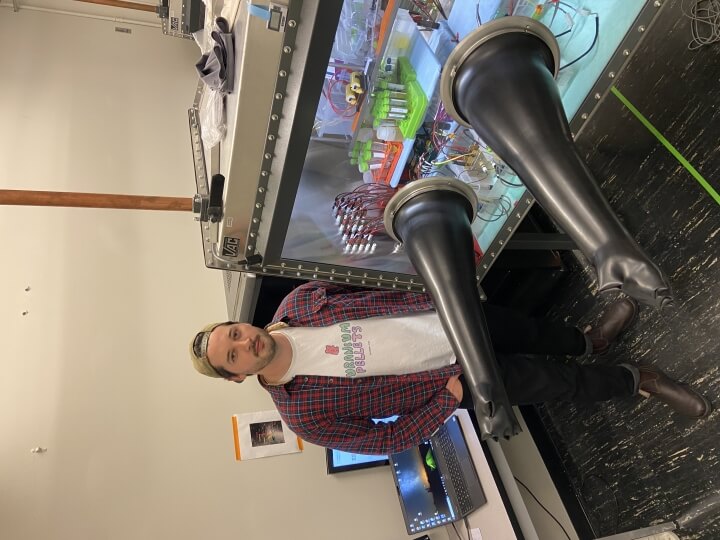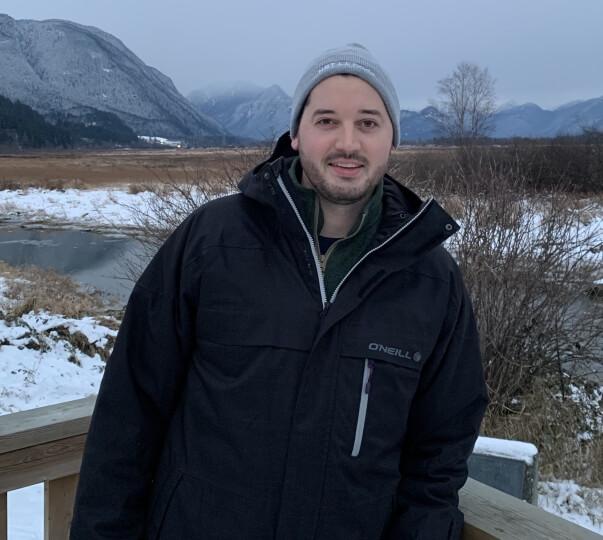How much would it cost to mine metals from asteroids?
Ph.D. candidate Eric Fell researches flow batteries with the Aziz Group at SEAS. (Eric Fell)
Eric Fell didn’t expect to talk about that while interviewing for a Ph.D. position at the Harvard John A. Paulson School of Engineering (SEAS), but his initial conversation with Michael Aziz, Gene and Tracy Sykes Professor of Materials and Energy Technologies at SEAS, quickly turned to that topic.
“I ended up having probably the greatest and funniest interview of my life,” Fell said. “We ended up spending two hours talking about mining asteroids for various metals. It was a hypothetical question, and we just sort of nerded out and connected.”
That interview paved the way for Fell to join the Aziz Group as a Ph.D. candidate in mechanical engineering and materials science, where he develops high throughput electrochemical methods to characterize flow batteries. In his spare time, Fell is co-president of the Harvard Energy Journal Club (HEJC). That’s allowed him to learn and teach about multiple other areas of energy research, from green energy to fossil fuels to nuclear power.
“It is one of the coolest clubs on campus,” Fell said. “It’s been a really great learning environment, and really accessible to anyone that’s new and interested in energy.”
Fell arrived at Harvard with a bachelor’s degree in chemistry and minor in nuclear science from Simon Fraser University in Canada. He’d already begun to work on green energy as an undergraduate, studying overseas as a research fellow at Paderborn University and Ludwig-Maximilians-Universität in Germany. He researched catalysts for splitting water molecules both in Germany and at Simon Fraser, which is what brought Fell to Aziz’s attention.
“Eric has been terrific,” Aziz said. “He has been the organizing force within our lab. His broad range of interests has also been clear from the start – from the mining of rare metals in asteroids to nuclear reactor designs to his presidency of the Harvard Energy Journal Club to electrochemistry for energy storage.”
Fell’s passion for renewable energy makes him a great fit for the organic flow battery research in the Aziz Group. Organic flow batteries are designed to be affordable, safe ways to store power generated from intermittent sources like solar and wind. The goal is to design something consumers can keep in their basements without worrying about the toxic materials found in traditional batteries.
“The areas that our flow battery collaborations really look at is how we make new molecules, how we make them cheaper, and how we make them more robust and so that they last longer,” Fell said. “For us, it’s the cost to manufacture and synthesize the molecules that go into our batteries, and how long will they last before they degrade and you need a top-up.”
Originally from Canada, Eric Fell joined SEAS as Ph.D. candidate in mechanical engineering and materials science in 2017. He quickly found his way to the Harvard Energy Journal Club, eventually becoming president of the student organization. (Eric Fell)
Fell joined SEAS in 2017, and it wasn’t long before he gave his first presentation to the HEJC. He joined at the insistence of Christina Chang, a Ph.D. candidate at the time with the Gordon Research Group in the Harvard Department of Chemistry and Chemical Biology, a frequent collaborator with the Aziz group.
“My first week she grabbed me and told me to come to a club meeting, and I’ve been going ever since,” Fell said. “It’s cool to see the ecosystem that’s been developing here for a while.”
Formed in 2005, the HEJC holds weekly meetings at which one member gives a presentation on an energy-related topic, and at least one guest speaker also presents each semester. This semester’s topics have ranged from nuclear energy to cement industry decarbonization to the energy implications of trains versus airplanes.
“We really like to stress that ideally someone should not be giving a talk in their actual area of expertise, because then people are learning and sharing what they learn at the same time,” Fell said. “Our primary purpose is to enable anyone who wants to be involved to develop the necessary technical background to better understand the energy issues that are happening all around us every day.”
Fell was elected vice president of the club for the spring 2020 semester, and one year later became president. He loves researching energy, and with Harvard has found the ideal place to do it.
“It’s been a life-changing experience,” he said. “Even now in my fifth year, I’ll catch myself realizing exactly where I am and the luck of the draw that got me here.”
Press Contact
Matt Goisman | mgoisman@g.harvard.edu

